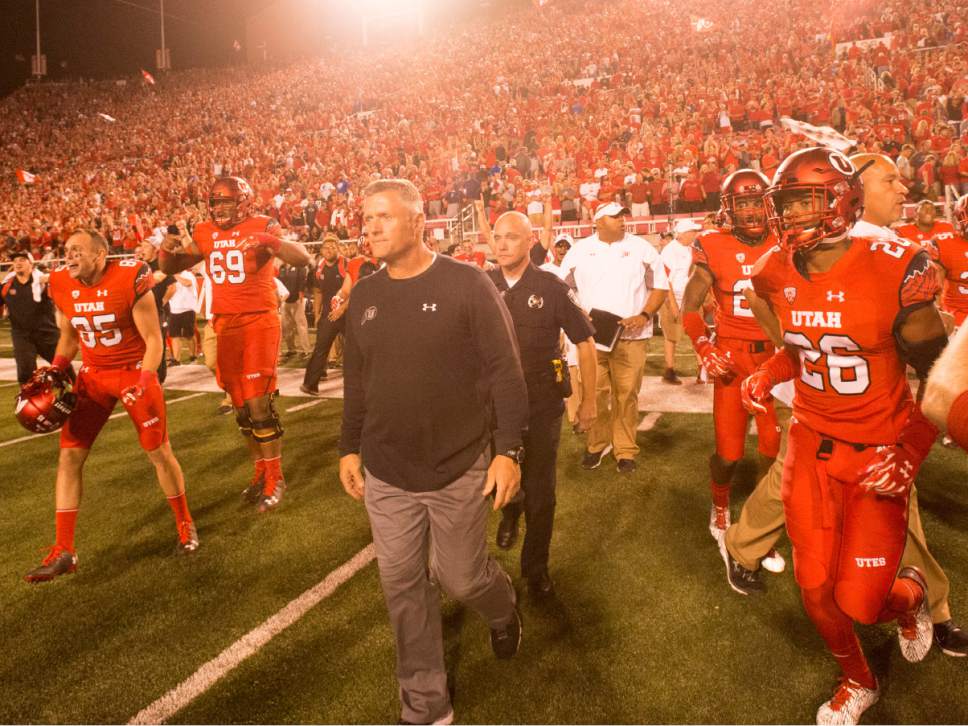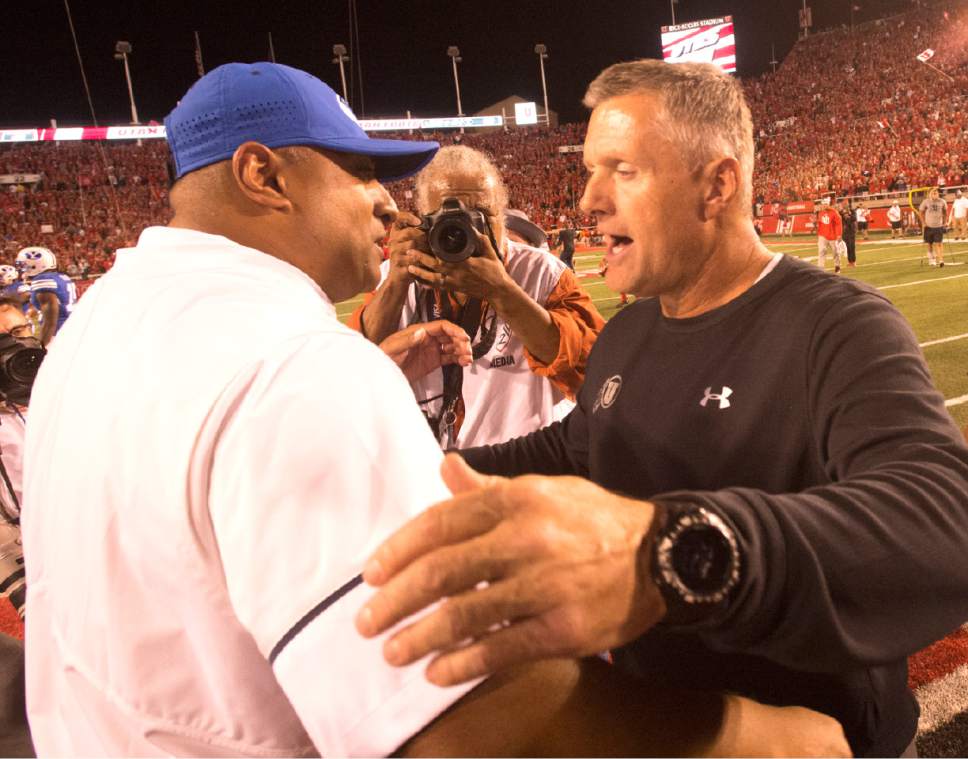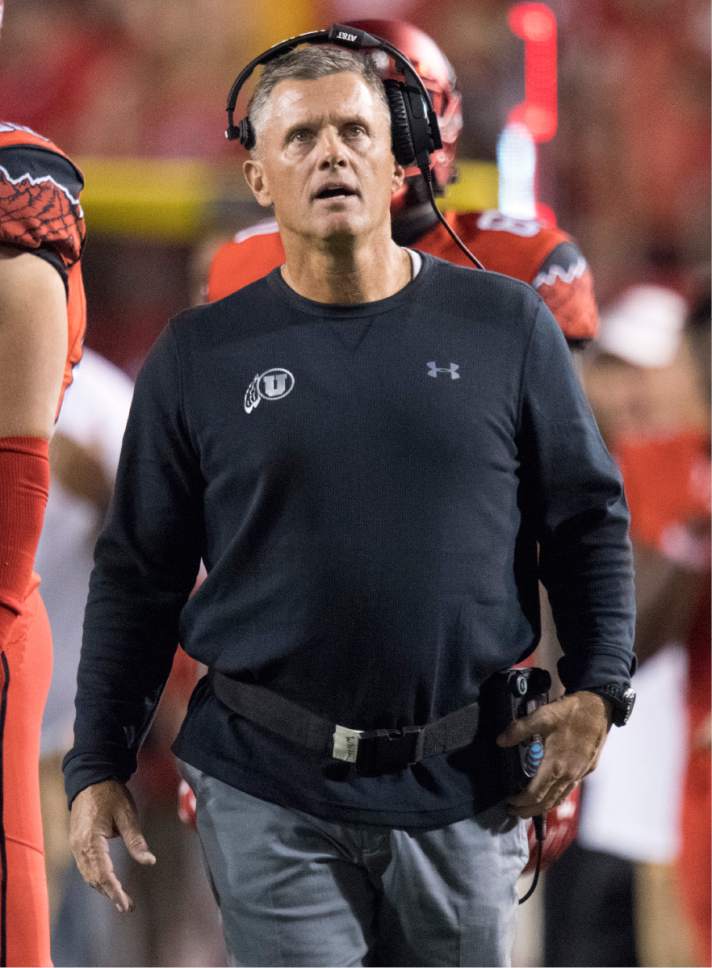This is an archived article that was published on sltrib.com in 2016, and information in the article may be outdated. It is provided only for personal research purposes and may not be reprinted.
The scoreboard in coach Kyle Whittingham's mind last Saturday told him the Utah defense delivered a winning performance against California.
So he blamed his offense for not topping Cal's scoring total, which the Utes could or should have done via a run that was stuffed at the 1-yard line on the final play of the 28-23 loss.
Morgan Scalley, Utah's defensive coordinator, disagreed with his boss. Fred Whittingham Jr., an offensive assistant, agreed with his older brother.
"They out-executed us on some things," Scalley said, "but there were some boneheaded mistakes that we made as well. We'll fix those and move forward."
"We left points on the board," said Fred Whittingham, who coaches the tight ends.
So nobody's feeling either vindicated or persecuted by Kyle Whittingham's analysis, and more egregious double standards exist in society than this Ute football example. Yet the indictment of the offense has become such a familiar theme after Utah's losses in recent years that it is generally accepted as truth — even when the defense should absorb its share of responsibility, as Scalley did after Tuesday's practice.
Whittingham's blaming the offense almost seems almost reflexive by now, like the way he begins each news conference with "OK." It seemingly never is the defense's fault, according to his postgame breakdowns. That's understandable, considering the defense has been the better behaving child in the Ute family for most of his 12-year tenure as head coach.
The offense is improving this season, though, disregarding the ending in Berkeley. The Utes rank sixth in the Pac-12 in passing yards and eighth in total offense, and Fred Whittingham hopes the offense someday can match the program's standards for defense and special teams.
"We want to always do our part," he said.
The sample size is limited, because Utah has lost only five of its past 22 games, but the trend is unmistakable: Kyle Whittingham publicly has assigned more blame than the offense deserved, while letting the defense slide. Texas A&M fans never say the Aggies lost a game; they just were "outscored." Whittingham never says the Utes were outscored; they just didn't score enough points.
In fairness, the offense never has topped 30 points (even in double overtime) in those five defeats. But only in a 17-9 loss to UCLA last November has the defense completely deserved a better outcome.
That subject was debatable in Berkeley, where the Utes gave up touchdown passes of 40, 39, 24 and 56 yards and allowed 7.4 yards per play. Whittingham said those four scores were acceptable against a dynamic offense like Cal's. As he clarified Tuesday, "Twenty-eight points, in this day and age of football, if you're going to give that up on 'D,' you're going to win most games."
Whittingham also credited his offense with "a lot of positives," including the ball-control success that enabled Cal to have only 10 possessions. Even so, the Bears scored four touchdowns. That's a high percentage.
The stories are similar from Utah's other four losses since mid-November of 2014. After a 42-10 home loss to Arizona that season, Whittingham bitterly pointed out the Ute offense allowed Arizona's defense to outscore it, 14-10. He ignored the Utah defense's allowing 298 rushing yards and 520 total yards.
Last October at USC, after interceptions resulted in a touchdown return and a 4-yard scoring drive by the Trojans in a 42-24 defeat, Whittingham said, "Tough to give them, essentially, three touchdowns off turnovers."
He miscounted, while overlooking USC's scoring drives of 88, 76, 83 and 92 yards.
At Arizona three weeks later, Whittingham lamented a late fumble at midfield and a dropped pass that ended another drive in an eventual 37-30 double-overtime loss. The defense allowed 460 yards.
To Whittingham's credit, he never uses injuries as excuses, even with the Utes being hit hard lately. He also cares about semantics, such as confirming Tuesday that he was properly using "tenuous" in describing Utah's center position. Several years ago, he stopped saying "pick up the rifle" as his expression for replacing injured players, recognizing the insensitivity to actual soldiers. He has amended it to "sword," perhaps in tribute to his friend, Washington State coach Mike Leach, a pirate aficionado.
In any case, when Whittingham earns his 100th career victory Saturday against Arizona, we'll see if he starts the postgame news conference with a new phrase. And whenever the Utes lose again, maybe he'll include the defense in his critique — assuming those guys deserve some blame, as they did at Cal.
Twitter: @tribkurt







